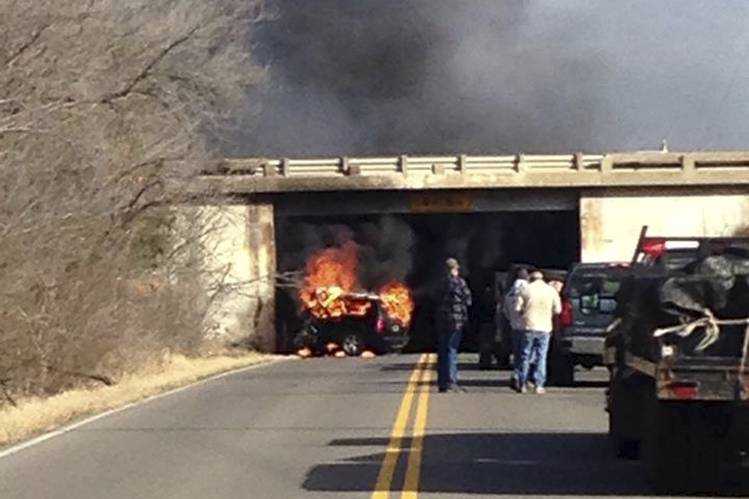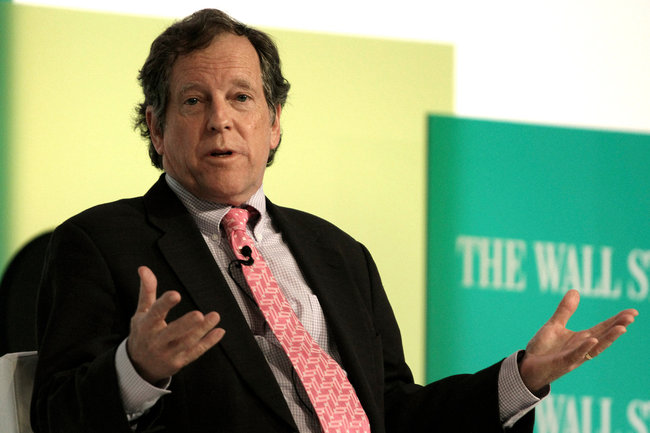Chesapeake’s McClendon dies!
March 3rd, 2016
 Thanks to a “little birdie” for the heads up!
Thanks to a “little birdie” for the heads up!
The day after indictment of Chesapeake’s Aubrey McClendon, he crashes into bridge abutment on left side of road at “high rate of speed” and dies in a firey crash.
Energy pioneer McClendon dies in Oklahoma car crash a day after indictment
Ex-Chesapeake CEO Aubrey McClendon dead after car accident
McClendon remembered as energy ‘visionary’ despite controversy
Here’s the report that exposed his dealings to the world:
Special Report: Chesapeake and rival plotted to suppress land prices
He’s also made massive political donations, including to “friend of fracking” Hillary Clinton in 2008, and also $250k to the Swiftboaters. From Sourcewatch:
McClendon has donated to both Republican and Democratic political candidates, though most of his donations and his major donations have been to Republicans or Republican-associated groups, including the Republican National Committee, National Republican Congressional Committee and Oklahoma Leadership Council; [12] and 527 groups, most notably the Swift Boat Veterans for Truth, to which he contributed $250,000 in 2004. [13]
But that’s not all — Chesapeake bought off Sierra Club during Carl Pope’s reign:
From Slate, about McClendon’s death and legacy:
Why Aubrey McClendon, the Fracking CEO Who Died in a Crash Wednesday, Was His Industry’s Perfect Symbol
Aubrey McClendon, the high-flying founder and former CEO of Chesapeake Energy, a pioneer of the fracking revolution, died Wednesday in Oklahoma City after his car hit a wall in at high speed. McClendon, 56, had been indicted Tuesday on federal charges of conspiring to rig bids on leases when he was CEO of the Chesapeake. According to the New York Times, he was supposed to be in court later in the day.
In his field, McClendon was victim both of his own success and of some familiar business and character flaws. Those who have seen Hamilton will recognize his particular American archetype: relentlessly aggressive, self-made, brilliant, a balls-out risk taker even when he had it made, tolerant of big losses, able to pick himself immediately after getting knocked down, a man of large appetites. And, also, it turns out, a little crazy. McClendon was of a personality type described by the psychologist John Gardner in his book Hypomanic Edge, one that you often see during booms and busts. You don’t need the hypomanic edge to succeed in America. But you might need it to succeed at scale, at national level, in a place as big and large as this.
After the Internet, fracking might be the most significant technological development of the last 30 years. The techniques of hydraulic fracturing have liberated, at low cost, immense amounts of oil and natural gas, lowering energy costs, turning the U.S. from an energy importer into an energy exporter. And McClendon was there right at the beginning. If you want to understand, read these two books by Wall Street Journal reporters: Greg Zuckerman’s The Frackers and Russell Gold’s The Boom: How Fracking Ignited the Energy Revolution.
Chesapeake—which, despite its name, is based in Oklahoma—is the second largest producer of natural gas in the U.S. McClendon founded it in 1989 with 10 people and built it into a Fortune 500 company thanks to its combination fracking and aggressive deal-making. With his wealth he acquired a magnate’s usual toys, including a chunk of the Oklahoma City Thunder.
But McClendon was undone by the type of behavior that is surprisingly common among people who have built large enterprises rapidly. Having built a huge fortune and a huge company, he leveraged it further and lived ever larger. As Reuters reported in a big 2012 investigation, McClendon bought a slew of high-end properties, used corporate jets for family travel, borrowed money against his holdings, and ran a hedge fund out of the company’s offices.
Such behavior can be tolerated or overlooked when a company is booming. But there’s much less margin for error when the markets turn against you. Fracking became such a potent technology that annual natural gas production in the U.S. soared by 40 percent between 2005 and 2015. Much of the natural gas found its way into power plants; between 2005 and 2015, the percentage of U.S. electricity derived from natural gas rose from 19 percent to 32 percent. But fracking has produced a glut. While there is a small and growing market for natural gas as a transportation fuel, particularly in bus and trucking fleets, there is a cap to domestic demand. And while you can easily export oil by piping it onto tankers, exporting natural gas requires the construction of enormously expensive import and export terminals, equipment, and specialized ships that can carry the cargo. Led by Chesapeake and its cohort, the U.S. vastly increased its production of natural gas without boosting its capacity to use or export it.
That was great for the U.S. economy. The supplies of cheap natural gas have helped lower emissions, boost air quality, keep power prices down, and provided an enormous competitive advantage to chemical plants and other industries that use natural gas as a feedstock or ingredient. But it has proven to be bad news for highly leveraged companies in the business of natural gas production, like Chesapeake.
Between May 2008 and May 2012, Chesapeake’s stock fell by about two thirds. And the falling stock took McClendon down with it. Rather than sell shares of the company he founded, he borrowed money with the stock as collateral. In 2012, margin calls forced him to sell big chunks of stock. As investigations mounted in the wake of the Reuters report, McClendon stepped down as CEO in January 2013.
Rather than sulk off and enjoy his still substantial wealth, McClendon almost immediately set up a new energy company, just down the street from Chesapeake’s headquarters. “We’re built to be opportunistic and bold,” the company, American Energy Partners, proclaims on its website. American Energy Partners raised boatloads of money from private equity investors to invest in natural gas production.
As McClendon was building his new company, however, federal prosecutors were building a case against him. The indictment charges that McClendon conspired with executives at another, unnamed company, to rig bids on natural gas leases. And reading between the lines, it seems like Chesapeake—the company he founded—had been cooperating with the investigation.
McClendon’s rapid rise and fall highlights a unique aspect of America’s historic economic development. It often takes bubbles to create new industries and build new industrial infrastructure in the U.S. And it often takes highly ambitious rogues to make those bubbles happen.
——–



